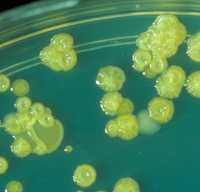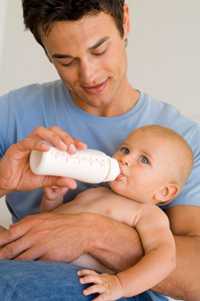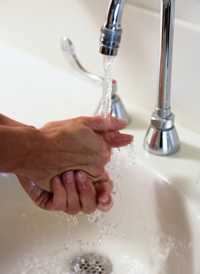Prevention & Control

Getting sick with Cronobacter is rare, but infections in babies can be fatal.
When a source of a baby’s Cronobacter infection has been found, nearly all have been associated with consumption of reconstituted powdered infant formula. Powdered infant formula is not sterile. Manufacturers report that, using current methods, it is not possible to eliminate all germs from powdered infant formula in the factory. In some investigations, Cronobacter was found in powdered infant formula that had been contaminated in the factory 1,2. In other investigations, Cronobacter was found in opened containers of powdered infant formula that might have been contaminated at home or elsewhere 1,3.
Very young babies (<3 months), infants born prematurely, and infants with weakened immune systems are at the highest risk. Parents or caregivers of these babies may want to take extra precautions to protect against Cronobacter infection by following the recommendations below.
Breastfeed

Breastfeeding is the best option for feeding your baby. It provides many health benefits and helps prevent many kinds of infections among infants. Almost no cases of Cronobacter infection have been reported among infants who were being exclusively breastfed (meaning, the baby was fed only breast milk and no formula or other foods).
If you use a breast pump, practicing careful hygiene can reduce the risk of germs getting into the milk.
- Read all of the instructions that came with your pump, and make sure you understand the manufacturer’s instructions for handling and cleaning your pump’s flanges, valves, and collection bottles. Learn which parts must be washed and the best method for removing, cleaning, and drying parts that need to be cleaned.
- Clean your baby’s feeding bottles in a dishwasher or by hand.
- In a dishwasher, use hot water and a heated drying cycle.
- By hand, scrub in hot, soapy water in a tub or basin reserved for washing bottles, then rinse well and air dry on a clean rack or dish towel.
- Consider using a bottle sterilizer or boiling the bottles after washing and rinsing them by hand.
- Wash your hands with soap and water before pumping, and be sure anyone preparing bottles or feeding your baby washes their hands with soap and water first.
If your baby gets formula, consider choosing infant formula sold in liquid form, especially when your baby is a newborn or very young.

Liquid formulations of infant formula are made to be sterile and should not transmit Cronobacter infection when handled carefully. To prevent contamination of liquid formula:
- Wash hands with soap and water before preparing bottles or feeding your baby.
- Clean your baby’s feeding bottles in a dishwasher or by hand. In a dishwasher, use hot water and a heated drying cycle. By hand, scrub in hot, soapy water in a tub or basin reserved for washing bottles, then rinse well and air dry on a clean rack or dish towel. Consider using a bottle sterilizer or boiling the bottles after washing and rinsing them by hand.
- If your baby does not finish drinking a bottle within 2 hours, throw away the unfinished formula.
If your baby gets powdered infant formula, consider the following steps to decrease the risk of Cronobacter infection.
In most cases, it is safe to mix powdered infant formula following manufacturer’s instructions. But if your baby is very young (<3 months), was born prematurely, or has a weakened immune system, you may want to take extra precautions to protect against Cronobacter. Good hygiene, mixing the formula with water hot enough to kill germs, and safely storing formula can prevent growth of Cronobacter and other germs, like Salmonella 1.
-
Clean up before preparation
- Wash your hands with soap and water
- Clean bottles in a dishwasher with hot water and a heated drying cycle, or wash bottles in hot, soapy water by hand and then sanitize them
- Clean work surfaces, such as countertops and sinks
-
Prepare safely
- Keep powdered formula lids and scoops clean (be careful about what they touch)
- Close containers of infant formula or bottled water as soon as possible
- Use the World Health Organization’s guidance [PDF – 32 pages] for using hot water to prepare powdered infant formula. These steps, when followed correctly, can kill Cronobacter and other bacteria in formula.
- Boil water and allow to cool to no less than 158° F/70° C before pouring into a clean and sterilized feeding cup or bottle. To achieve this temperature, the water should be left for no more than 30 minutes after boiling.
- Add powdered infant formula. Use the amount as instructed on the formula label.
- Carefully shake, rather than stir, formula in the bottle.
- Immediately cool formula to body temperature to ensure it is not too hot before feeding your baby by running the prepared, capped bottle under cool water or placing it into an ice bath, taking care to keep the cooling water from getting into the bottle or on the nipple
- Before feeding the baby, test the temperature by shaking a few drops on your wrist
-
Use quickly or store safely
- Use formula within 2 hours of preparation. If the baby does not finish the entire bottle of formula, discard the unused formula.
- If you do not plan to use the prepared formula right away, refrigerate it immediately and use it within 24 hours 2. Refrigeration slows bacterial growth and increases safety 1.
- When in doubt, throw it out. If you can’t remember how long you have kept formula in the refrigerator, it is safer to throw it out than to feed it to your baby.
References
-
FAO and WHO. Enterobacter sakazakii (Cronobacter spp.) in powdered formulae: Meeting report. [PDF –
121 pages] Microbiological Risk Assessment Series 15. 2008. ISBN 978-92-5-106119-0. - WHO, Food and Agriculture Organization of the United Nations. Guidelines for safe preparation, storage and handling of powdered infant formula. [PDF – 32 pages] 2007.
Practice proper hygiene

- Always wash your hands carefully with soap and water during key times.
- Before preparing and feeding bottles or foods to your infant.
- Before touching your infant’s mouth.
- Before touching pacifiers or other things that go into your infant’s mouth.
- After using the toilet or changing diapers.
- If soap and water aren’t available, use an alcohol-based hand sanitizer. These alcohol-based products can quickly reduce the number of germs on hands in some situations, but they are not a substitute for washing with soap and water.
- It is also important to keep all objects that enter infants’ mouths (such as pacifiers and teethers) clean.
More Information
Food Safety and Handwashing:
- WHO: Safe preparation, storage and handling of powdered infant formula guidelines [PDF – 361KB]
- Foodsafety.gov: Baby food and infant formula
- Handwashing: Clean Hands Save Lives, hand- and water-related hygiene tips
- Put Your Hands Together [PODCAST – 3:48 minutes], information on how to help stop the spread of infection and stay healthy
Breastfeeding:
References
- FAO and WHO. Enterobacter sakazakii (Cronobacter spp.) in powdered formulae: Meeting report. [PDF – 121 pages] Microbiological Risk Assessment Series 15. 2008. ISBN 978-92-5-106119-0.
- Himmelright I, Harris E, Lorch V, Anderson M. Enterobacter sakazakii infections associated with the use of powdered infant formula—Tennessee. JAMA. 2001;287:2204-5.
- Baumbach J, Rooney K, Smelser C, Torres P, Bowen A, Nichols M. Cronobacter species isolation in two infants—New Mexico, 2008. MMWR Morb Mortal Wkly Rep. 2009;58(42):1179-83.
- Page last reviewed: July 28, 2017
- Page last updated: July 28, 2017
- Content source:


 ShareCompartir
ShareCompartir